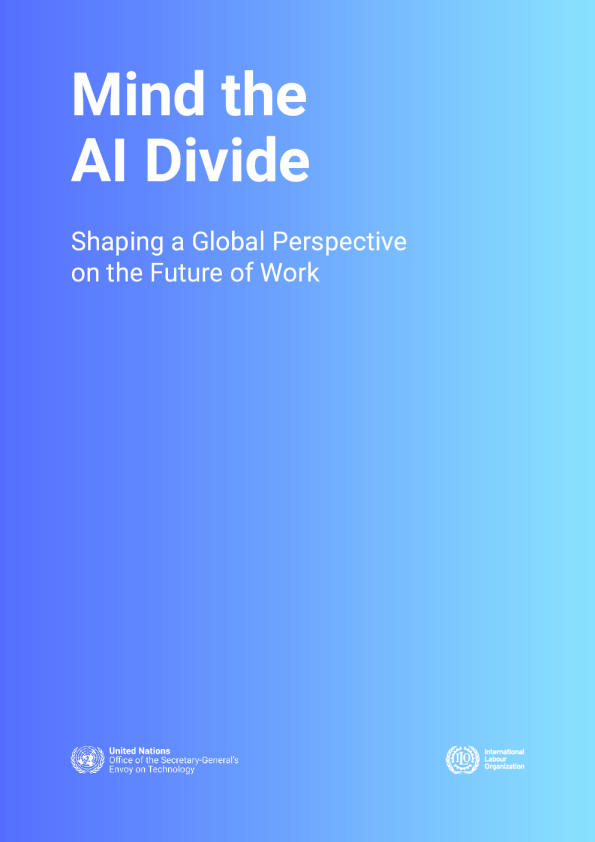2024小心人工智能的鸿沟:塑造未来工作的全球视角报告
 AI智能总结
AI智能总结
塑造对未来工作全球视角 请注意AI差距:塑造全球视角关于工作未来的研究 2024年6月 前言 人工智能(AI)的采用不均衡是一个超越经济增长的关键问题。它影响全球股权、公平性以及社会正义的核心——社会契约。在获得稳健的基础设施、先进技术、优质教育和培训方面的差距正在加深现有的不平等。随着全球经济越来越转向以AI驱动的生产和创新,欠发达的国家面临进一步落后的风险,加剧了经济和社会的鸿沟。如果没有旨在弥合这一数字鸿沟的有针对性的集体努力,人工智能促进可持续发展、减轻贫困的潜力将无法实现,这使得全球人口中的很大一部分人在快速发展的技术领域中处于不利地位。 在秘书长人工智能高级咨询小组举行的磋商中,已经明确,劳动世界是人工智能采纳的核心。因此,了解人工智能对劳动需求的影响以及转变职业的能力至关重要。正是在工作场所,生产力增长和改善工作条件的潜力可以得以实现,从而造福工人、他们的家庭以及整个社会。但这样的益处不会自动发生;只有在适当的条件下才能实现,包括数字基础设施和技能的可获得性,以及培育技术积极融合的社会对话文化。 推动包容性增长需要采取积极策略以支持处于人工智能鸿沟另一边国家的AI发展。这包括增强数字基础设施、推广技术转让、培养人工智能技能,并确保人工智能价值链上的所有工作都是高质量的,并能改善劳动人民的生活。通过优先考虑人工智能能力建设的国际合作,我们可以创建一个更公平、更有韧性的AI生态系统,解锁全球共享繁荣和人类进步的机会。 我们期待继续我们共同的努力,塑造人工智能的全球治理,维护人权和劳工标准,以及为所有人扩展经济机会。 目录 3前言 56第1节. 简介第二节. 不均衡的土壤:理解人工智能在重塑劳动力市场中的角色 第三部分:人工智能价值链与技能需求11 14适应AI领域的技术技能 17第四章. 展望未来:加强国际合作,构建国家能力,以及在工作世界中应对人工智能 17 加强人工智能领 1818构建国家人工智能能力朝着在职场中积极整合人工智能的方向 20 致谢 21 参考文献 引言 人工智能(AI)的快速发展预示着对我们社会、经济和职场世界的广泛变革。虽然这样的进步为创新和生产力提供了巨大的机遇,但各国在投资、采用和使用方面的不均衡速度可能加剧已经相当大的收入和生活质量差距。存在一个明显的“人工智能分化新兴市场,高收入国家在人工智能进步中获益不均,而低中收入国家,尤其是在非洲,落后于其他国家。更糟糕的是,除非采取一致行动来促进支持发展中国家的国际合作,否则这种差距将扩大。缺乏此类政策不仅会扩大全球不平等,而且风险浪费人工智能作为广泛社会和经济进步催化剂的潜力。 对话。关于工作场所中技术的设计、实施和使用,以及制定确保尊重工人基本权利的必要法规的对话是必要的。事实上,技术融入工作流程是否能够推动生产力增长或改善支持社会正义的工作条件,在很大程度上取决于这种合作和对话的强度。 在塑造人工智能能力构建的过程中,主权努力的发挥起着至关重要的角色,因为国家在制定适应他们独特社会经济背景的策略和政策时,坚决主张自己的自主权。受文化价值观、政治经济和社会需求驱动的本土进程,可以极大地影响人工智能项目的有效性和可持续性。然而,资源和 expertise 上的差距仍旧存在,可能会阻碍全球南方的人工智能发展。作为回应,越来越认识到发达国家应支持资源匮乏的国家开展能力建设活动。正如联合国秘书长的 AI 高级别咨询机构近期发布的临时报告所概述的那样。1这种认可不仅限于经济援助,还包括知识共享、技能发展、技术转让,以及协作研究与开发伙伴关系。通过利用其先进的AI生态系统,全球北方国家可以帮助弥合差距,赋能全球南方国家利用AI实现可持续发展,同时尊重其主权并促进当地创新生态系统。通过优先考虑全球合作以加强AI能力建设,国际社会可以培育一个更加公平和有弹性的全球AI生态系统,解锁全球共享繁荣和人类繁荣的机会。 虽然人工智能可能会影响我们日常生活的许多方面,但它的冲击可能在工作中最为尖锐。发达国家在工作世界中更容易受到人工智能潜在的自动化效应的影响,但它们也处于更有利的地位来实现其带来的生产力收益。另一方面,发展中国家由于缺乏数字基础设施,可能暂时有所缓冲,但这种缓冲可能会转变为生产力增长的瓶颈,更重要的是,可能成为其人口未来繁荣的障碍。 确保未来实现包容性增长需要采取积极主动的措施来赋能处于数字鸿沟不利端的国家的AI发展,培育数字基础设施以及AI技能,并促进技术转移和吸收。这些数字技能还可以使AI在职场中的整合更加积极,尤其是在与社会相结合时。 不均匀的地面 理解人工智能在重塑劳动力市场中的作用 关于生成式人工智能对全球就业可能产生的影响的研究表明,虽然某些职业可能会经历重要的变革性影响,但就岗位损失而言,其影响远低于媒体报道的标题数字,并且绝对不可能指向无就业的未来。根据国际劳工组织对任务可能受到生成式人工智能技术影响的分析,文职支持人员是最易受影响的职业群体,这些岗位中有24%的任务与高度自动化暴露相关,另有58%的任务与中等程度暴露相关(见图1)。2其他职业群体受影响较小,仅有1%至4%的任务被视为具有高风险。 自动化潜力,以及中度暴露的任务不超过25%。这意味着,尽管这些职业中某些任务有可能实现自动化,但大多数任务仍需要人工干预。这种部分自动化可以通过让人类有更多时间投入到其他工作领域,从而实现效率提升。 重要的是,任务自动化并不一定意味着冗余,因为当只有某些任务被自动化时,这项技术也可以补充或增强人力劳动。该技术的采用导致自动化(失业)还是增强(工作互补性)取决于自动化任务对职业的核心性,以及技术如何被整合。 人工智能技术在文书职业中的过度代表导致其水平较高(见图2)。在大多数地区,女性的潜在暴露程度是男性的两倍多。其中一些就业是在业务流程外包领域,如客户服务或呼叫中心工作,这是包括印度和菲律宾在内的一些发展中国家的经济的重要组成部分。该行业是正式且相对较高薪酬就业的重要来源,尤其是对女性而言。尽管潜在的暴露并不一定导致失业,但很明显,技术的进步可能会使一些这些工作面临风险。3 在工作中流程以及管理层保留人类执行或监督部分任务的愿望,尽管自动化具有潜力。 国际劳工组织(ILO)的分析使用了职业暴露评分(职业中每个任务的平均暴露量)并将这些评分应用于来自140多个国家劳动力调查的就业数据,以评估全球和区域层面的潜在就业影响。在自动化方面,面临暴露的就业份额在欧洲和北美洲最高,反映了这些地区更广泛的经济和劳动力市场多元化。在拉丁美洲、亚洲和非洲,由于在这些地区从事不会受到生成式人工智能技术暴露的职业(如农业、运输或食品销售)的工人比例较高,因此面临自动化的就业潜在份额要小得多。 另一个发现是,在具有高增强潜力的职业中,总就业的份额显著更大,这一现象在各个地区都存在,从撒哈拉以南非洲的10.2%到东南亚及太平洋地区的16.1%(见图3)。因此,职业从技术提高生产率的效果中受益的潜力在国家间相对相似。然而,在实践中,这种情况发生的可能性较小。 尽管如此,女性可能面临自动化生成效应的潜在影响。 由于物理基础设施(电力获取、宽带)以及数字技能方面的限制而难以实现。事实上,后续的研究在纳入工作场所计算机使用数据[2]后揭示,许多具有增强潜力的职业在工作场所的计算机使用相对较低, 暗示当前条件不足以实现潜在的生产率增长。 如图4所示,在工作场所没有电脑可用的工人(“无电脑”)在16个国家中的9个国家超过了使用电脑的工人。 利用生成式AI技术在他们的客服中心工作、数字基础设施以及熟练的劳动力也可能会成为培育配套产业增长的资产。发挥这种潜力至关重要。 这样,从生成式AI技术中获得生产率提升的可能性将受到限制。 图5提供了有关可能受生成式人工智能技术在拉丁美洲的自动化影响的特征人群的信息。如图所示,最易受影响的是受过教育且居住在城市地区的女性,她们属于收入分配的前五分之一。在拉丁美洲,这些职业绝大多数是工资收入、正式就业,以及金融、专业服务和公共行政等领域。简而言之,这些都是好工作,其丧失将在经济和社会两方面产生负面的倍增效应。 的确,在合适的条件下,新一轮的技术浪潮可以推动增长机遇。在过去,技术进步在许多发展中国家催生了新的和成功的产业。一个这样的例子是肯尼亚的M-Pesa货币服务,它依赖于移动电话在肯尼亚的普及。该服务反过来增加了金融包容性,有助于推动中小企业的发展,并导致了11万个代理网络的建立,这是肯尼亚银行ATM数量的40倍[3][4]。同样,一项关于2002年至2019年卢旺达3G覆盖率扩散的研究发现,移动互联网覆盖率的增加 分析未提及新就业岗位的潜力。因此,尽管印度和菲律宾等中等收入国家更容易受到自动化效应的影响 因此,技术对工作条件的影响是积极还是消极,在很大程度上取决于工人在技术的设计、实施和使用中的发言权。拥有这种发言权又依赖于工人参与和对话的机会。这可以通过正式的设置进行,例如工作委员会或集体谈判协议中提供的指导,或者在不那么正式的工作场所进行,在这些场所员工参与度很高。欧洲的研究表明,在具有更强和更合作的工作场所协商形式的国家,即北欧国家和德国,工人更愿意在工作场所采用技术[10]。 与就业增长呈正相关,提高了熟练和非熟练职业的数量[5]。学者[6]也发现,从互联网进入12个非洲国家以来,尽管存在轻微的偏向于熟练职业的倾向,但也产生了积极的就业效应。这些收益归因于连通性增加后的生产力和市场增长,强调了这种投资的必要性,考虑到这些投资对经济和劳动市场的重大乘数效应。 在自动化增强下确保工作质量 另一个关注领域是关于人工智能技术在工作条件和就业质量方面的影响,当这项技术被整合到工作场所时。尽管这种技术集成到工作任务中可能通过自动化常规任务来促进更具吸引力的工作,但它也可能以限制工人自主权或加速工作强度的方式进行实施。关于人工智能在职场中的应用引发的关注主要集中在算法管理的增长上,本质上是一种“通过算法和跟踪数据分配、优化和评估人类工作”的工作环境[7]。算法管理是数字劳动平台的一个特征,但它在仓储和物流等线下行业中也很普遍。在仓库中,一个自动化的“语音拣选”系统指导仓库工作人员在仓库中拣选某些产品,同时使用数据收集来监控工人并设定工作节奏[8]。除了缺乏组织工作或设定工作节奏的自主权外,工人也几乎没有能力提供反馈或与管理层讨论工作组织问题[9]。将生成式人工智能整合到银行、保险、社会服务以及更广泛的客户服务等领域可能产生类似的影响。 技术进步通常在职场层面感受到更为直接,并且通常最好在职场层面解决。 人工智能价值链与技能需求 当数据被收集时,通常是无结构的。高技能的数据工程师会将数据预先处理成可用格式,但需要“数据标注员”对数据进行标注和分类,以便其可用。标注和注释的数据集对于机器学习模型的发展和有效性至关重要。参与数据丰富化的工作人员执行一系列任务,包括标记放射学扫描以帮助创建能够检测癌症的人工智能系统;对毒性内容和不合适的内容进行分类,以改进内容审核算法或减少大型语言模型响应中的负面情绪;标注驾驶会话中的视频片段以训练自动驾驶汽车;编辑大型语言模型输出以增强其功能;等等。4 与全球经济中许多商品和服务的生产一样,人工智能也有其自身的价值链。如图6所示,人工智能价值链包括不同的阶段,每个阶段都有特定的需要的人和社会基础设施。与大多数全球价值链典型情况一样,不同阶段因做出的贡献而获得的价值量不同,低附加值活动在中低收入国家占主导地位,而设计和部署则与高收入国家相关。 数据是人工智能系统开发和运营的基础。人为准备的数据被输入到人工智能系统中,以帮助它们学习功能所需的必要联系和模式。这些数据的来源多种多样,取决于系统的目的。公开可用的数据,如用于训练翻译程序的联合国文件,有助于自然语言处理的发展。专有数据也非常关键,尤其是在工作场所应用中,如用于训练客服聊天机器人的呼叫中心录音。随着全球互联互通,数据收集继续为未来的AI应用提供必要的原




